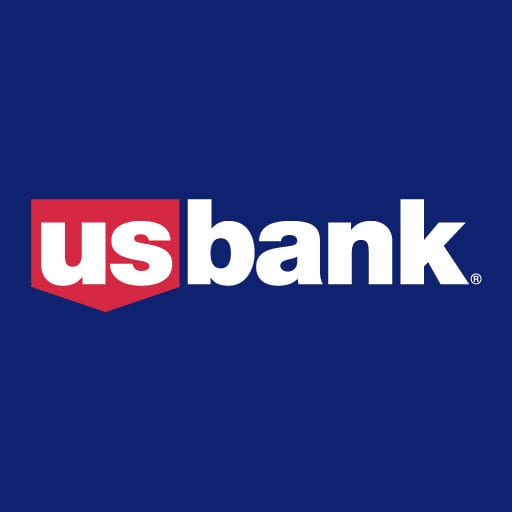Whether you’re freelancing, contracting, or launching a startup, one of the most important steps you can take is opening a small business bank account.
A business bank account can give you the tools you need to manage your finances, from checking and savings accounts to small business loans, credit cards, and bookkeeping services.
We’ve reviewed the best banks for small businesses based on their accounts, perks, fees, and customer service.
Top 9 Best Banks for Small Businesses
Here are the top banks for small business owners:
- 🏆 U.S. Bank: Best Account Variety
- Chase: Best for Comprehensive Banking
- Bluevine: Best for APY on Checking
- Live Oak: Best for APY on Savings
- Novo: Best Membership Perks
- Axos Bank: Best for New Businesses
- Capital One: Best for Transaction-heavy Businesses
- Wells Fargo: Best Traditional Bank
- NorthOne: Best for Managing Your Business
1. U.S. Bank Business Essentials Checking
🏆 Best Bonuses
- Monthly fee: $0
- Minimum opening deposit: $100
- APY: N/A
U.S. Bank offers a full slate of business banking products, all of which mix the best features of online and in-person banking. The bank has high-rated mobile apps and extensive branch availability, with many products for small businesses available nationwide.
We’re impressed with the variety of account options for small business owners. U.S. Bank has three business checking options, a savings account, three MMA accounts, credit cards, and a flexible range of CDs, along with credit cards and small business loans.
One of the biggest draws is U.S. Bank’s generous promotions.
Learn More:
Subject to certain terms and limitations. Offer valid through September 30, 2025. Member FDIC.
2. Chase Business Complete Checking®
🏆 Best for Comprehensive Banking
- Monthly fee: $15, waivable
- Minimum opening deposit: $0
- APY: N/A
Chase has over 4,700 physical branches in 48 states and an extensive lineup of business bank accounts, small business loans, merchant services, and credit cards. It also boasts a top-rated mobile app.
While it’s best known for its Chase Ink Business credit cards, Chase also has three business checking account options and two savings accounts, and it’s a top SBA lender.
The Chase Business Complete Checking® account is our top pick for small business owners. It has no minimum opening deposit requirement and the $15 monthly fee can be waived in multiple ways.
You get unlimited debit card purchases and transactions and can earn a $300 bonus when you sign up and complete qualifying activities.
Learn More:
- See the full details of the Chase Business Complete Checking® account bonus
- Read our full Chase Bank review
3. Bluevine Business Checking
🏆 Best for APY
- Monthly fee: $0
- Minimum opening deposit: $0
- APY: up to 3.70% APY on balances up to $250,000
BlueVine is an online-only business bank founded in 2013 and is partnered with Coastal Community bank so that all of its accounts are FDIC insured. The platform offers a bank account, lines of credit, business loans, and a payment processor.
We’re impressed with BlueVine’s sole Business Checking account. The account has no minimum balance requirements, monthly service fees, or overdraft fees, and you can earn up to 3.70% APY (annual percentage yield) on balances up to $250,000.
You can also grant account access to your team and make payments in 26 countries and eight different currencies.
Additionally, the account offers easy ACH transfers, unlimited transactions, and the ability to schedule one-off or recurring payments. The account comes with a Mastercard business debit card, two free checkbooks, and fee-free withdrawals from MoneyPass ATMs.
4. Live Oak Business Savings
🏆 Best High-Yield Savings
- Monthly fee: $0
- Minimum opening deposit: $0
- APY: 3.70%
Live Oak is another online financial institution with simple but impressive business checking, savings, and CD accounts backed by FDIC insurance.
While you can’t make cash deposits, the business checking account has human support, Allpoint ATM access, no hidden fees, and Quickbooks integration.
Live Oak’s business savings account stands out among the crowd. The account offers 3.70% APY on all account balances.
With Live Oak’s Insured Cash Sweep, your funds are FDIC-insured up to $10 million.
5. Novo Business Checking
🏆 Best Membership Perks
- Monthly fee: $0
- Minimum opening deposit: $0
- APY: N/A
Novo is a fee-free, online-only bank targeted directly at entrepreneurs, freelancers, and small business owners.
The tech company partners with Middlesex Federal Savings, F.A., Member FDIC to provide banking products on a powerful and intuitive digital interface.
One of our favorite features of Novo is its ease of use and integration with small business tools like Stripe, Square, and Slack. The account also comes with exclusive member-only discounts for tools like Gusto and Keeper.
You can open an account in less than 10 minutes. There are no ongoing account balance requirements or monthly fees.
The downside, however, is that Novo only offers checking accounts. So if you’re looking to keep all of your business finances at one bank, such as credit cards, loans, or savings accounts, you’ll need to look elsewhere.
Learn More:
6. Axos Bank Small Business Basic Checking
🏆 Best for New Businesses
- Monthly fee: $0
- Minimum opening deposit: $0
- APY: N/A
Axos Bank offers business interest checking, business savings, money market accounts, and CDs. As an online bank, Axos also has a plethora of digital tools and a user-friendly app.
It’s our top pick for new businesses, with tools like merchant services, payroll, and treasury management, and SBA loans to help startups. And business owners who open a new account can get a $400 bonus with qualifying activities when using our link below.
Axos offers two small business checking accounts: Basic Business Checking and the Business Interest Checking Account.
The Basic Business Checking account is one of the best basic banking solutions available to small businesses.
The account has no monthly maintenance fees and comes with unlimited free ATM transactions and up to 60 free mobile check deposits per statement cycle.
Learn More:
7. Capital One Business Enhanced Checking
🏆 Best for Transaction-heavy Businesses
- Monthly fee: $35, waivable
- Minimum opening deposit: $250
- APY: N/A
Capital One is at the top of our list of banks for active small businesses that make a lot of transactions.
The bank has two business checking accounts: Capital One Business Basic Checking and Capital One Business Enhanced Checking. Both come with unlimited fee-free digital transactions, and the latter offers five free outgoing wire transfers per month.
You can also open a business savings account with a competitive intro APY for 12 months.
Frequent spenders can enjoy unlimited 1.5-2x cashback with a Capital One® Spark® Cash business credit card. There’s also usually a large cash signup bonus when you make qualifying purchases.
Learn More:
8. Wells Fargo Initiate Business Checking Account
🏆 Best Traditional Bank
- Monthly fee: $10, waivable
- Minimum opening deposit: $25
- APY: N/A
While several banks offer stellar business banking, there’s one bank that ticks most, if not all, of the boxes for small businesses—Wells Fargo.
There are simple checking and savings options and more advanced business accounts for complex banking needs.
Like other big banks on this list, Wells Fargo also offers loans, CDs, credit cards, and merchant services, and no-hassle cash and check deposit at branches everywhere.
Additionally, Wells Fargo offers up to $5 million with its small business loans, and the interest rates are comparable with other big national banks such as Bank of America.
While traditional brick-and-mortar banks have some drawbacks like account fees and mediocre APY, they also have their benefits. Wells Fargo is highly reviewed for its customer service and has an extensive branch network of local banks, with more than 4,700 locations.
Learn More:
9. NorthOne Business Account
🏆 Best for Managing Your Business
- Monthly fee: $10
- Minimum opening deposit: $25
- APY: N/A
Similar to Novo, NorthOne is an online-only relative newcomer aimed squarely at small businesses. The company is tech-focused, with a robust mobile app that is highly rated (4.8 stars in the App Store).
It also offers integrations with your accounting, eCommerce, and point-of-sales tools (Quickbooks, Expensify, Amazon Pay, Shopify, Stripe, etc) to help streamline your business and eliminate manual data entry.
NorthOne is FDIC-insured and offers a network of 300,000 ATMs and Green Dot locations where you withdraw or deposit cash.
Unlike bigger banks, NorthOne only offers one checking account, but you can use “Envelopes” to save for taxes, payroll, or savings.
If you’re looking for comprehensive banking services, budget management, and integrations, the streamlined, user-friendly app could be a one-stop shop for managing your small business finances.
Learn More:
Benefits of a Small Business Bank Account
Most entrepreneurs start out by using their personal bank accounts to fund business expenses and pocket profits.
But it’s easy to open a business checking account and doing so comes with a lot of benefits:
- Taxes: It will help you keep your business and personal expenses separate, which makes tax season significantly easier.
- Legal protection: If your company is legally separate from you (an LLC or Corporation), then you need the financial separation to protect yourself in case of legal action.
- Added benefits: Business bank accounts include added benefits like limited personal liability protection and purchase protection for your customers.
- Lines of credit: Many business banks extend lines of credit to their customers.
- Tech integrations: Opening an account with one of the banks focused on entrepreneurs and freelancers lets you take advantage of their tech integrations so that you can run your business seamlessly across all of the different digital tools and platforms (Shopify, Stripe, etc).
How To Choose the Best Business Bank
There are many banks to choose from, and each bank offers different features. As you compare accounts, think about your unique business needs and how each account might meet them.
Factors to consider as you compare business accounts:
- Transaction fees: Will you make a ton of small transactions? Look for free transactions or transactions with low fees. Some accounts have no fees for a set number of monthly transactions.
- Mobile banking: Will you interact with your bank mostly online? Look for top-rated mobile apps and features such as online bill pay.
- Loans for operating expenses: Some businesses make all their money in just a few months but have expenses all year. Lines of credit or savings-backed overdraft protection features can help you stay in the black.
- Cash management: Cash is still king, but it’s also a hassle to deal with. If your business interacts with customers through cash make sure your bank offers free cash deposits and local ATMs if you need to make a withdrawal. If you never handle cash, you won’t need these features.
- Integration: If you interact with your customers online, you may want several ways to exchange funds. You can connect any bank to PayPal, but some banks can interact directly with your point-of-sale system to make transactions more seamless.
- FDIC protection: Make sure your bank is an FDIC member. FDIC banks have free insurance that will replace up to $250,000 in your business or personal account.
- Monthly balance: Unless you get a truly free business checking account, you’ll have to meet a minimum monthly balance to waive your monthly fee. Make sure your business will keep enough money in the bank to waive these fees—or budget for them.
- Physical branch locations: With so many great online banks, you may never need a physical branch. But if your business prefers an in-person approach to banking, choose a bank or credit union with a local presence and an ATM network or reimbursements of ATM fees.
Opening a separate business bank account is a significant step in your business journey – and you need to make sure that you know exactly what to look for to make the best decision.
Our Methodology
To provide you with dependable, thorough recommendations, we’ve carefully vetted and compared dozens of banks.
In order to present you with an accurate list of the best banks for small businesses, we looked at online banks, local banks, and fintech companies backed by FDIC-insured banks.
Here are the metrics we used to assess each bank on the list:
- Product selection: We examined the types of accounts, loans, and business management tools offered by each bank.
- Account features: We looked into key account features like mobile deposits, the ability to send and receive wire transfers, transaction limits, and the ability to write checks.
- APY: We also factored in whether or not each bank offers interest on its checking or savings accounts.
- Cost: Our analysis compared the fees and pricing structure of each bank, from monthly maintenance fees to transaction fees.
- Customer support: To gauge customer service, we look to sources like the Better Business Bureau and customer reviews. We also explore each institution’s customer service hours and contact methods.
- Integrations: We explored whether or not each bank supports integration with payroll, merchant processing, or tax technologies.
- Security: Each bank we review is FDIC-insured and takes proper security measures to protect your information and funds.
- User Experience: We’ve examined each bank’s online tools and resources, read reviews, and consider the ratings of each bank’s mobile app.
- Branch and ATM access: Additionally, we note whether or not each bank has local branches, ATM access, or reimbursement for out-of-network ATM fees.






No comments yet. Add your own